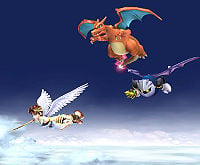Glide: Difference between revisions
(Undid edit by Sm4shmeister: They're pages we NEED one day, so yes, actually, we do have them.) |
Noelephant (talk | contribs) (→See also: Broken links) |
||
| Line 23: | Line 23: | ||
==See also== | ==See also== | ||
*[[Meta Knight (SSBB)/Glide attack|Meta Knight's glide attack in ''Brawl'']]. | *[[Meta Knight (SSBB)/Glide attack|Meta Knight's glide attack in ''Brawl'']]. | ||
==External links== | ==External links== | ||
Revision as of 22:19, June 20, 2018
Gliding (滑空, Gliding) is a technique in Super Smash Bros. Brawl available to Meta Knight, Charizard, and Pit, characters notable for having wings. Once in a glide, the character gliding will fly forward at a rather quick speed, while being able to angle themselves up and down and attack out of the glide. Characters cannot turn around during glides.
The three characters each have slightly different glide mechanics. Meta Knight's glide can have the sharpest angle while gliding up or down, while Charizard's sharpest gliding angle is much wider than PIt and Meta Knight's. Charizards glide is also the heaviest, but in contrast, it is the fastest of the three glides when gliding at the default angle. Pit's is somewhat easier to control due to going slightly slower.
Gliding after using one's final midair jump will put one's character into a helpless state. If a character glides into a floor, the character will enter a fallen position. This action is commonly known as glide tripping, though it is not the same as an actual trip.
Peach possesses a similar ability from Melee onward called floating, though it is not identical. Differences include the fact that it has a time limit, it can be moved forward or back, and it cannot change elevation.
Gliding was removed in Super Smash Bros. 4, though there are files for Pit, Dark Pit and Meta Knight in the game that suggest it was at one point intended to make a return. This also applies to Shuttle Loop.
Performing a glide
To glide, characters must jump and perform a midair jump. If a player continues holding down the jump button, they will start gliding. Alternatively, at the peak of the jump, players can tilt the control stick/d-pad left and then right in quick succession to start gliding. The latter is the only option for Wii Remote users. Meta Knight can also start gliding by using his Shuttle Loop, but this glide is slower, and will put Meta Knight in a helpless position no matter how many jumps he has remaining.
The glide direction can be controlled by tilting forward or down to angle downwards and backward or up to angle upwards. Gliding downwards gives the character a speed gain, while gliding upwards will make the character steadily lose speed until he stops moving. Once this happens, the glide ends. Jumping out of a glide ends it more quickly than attacking out of it. If players do not cancel the glide and move into the stage's surface, they will crash into it and lay down, as if they had been knocked down.
As Shuttle Loop always starts a glide, Meta Knight can glide twice before having to touch the ground. This can be utilised to stall under the stage, which is known as scrooging. The use of scrooging is banned in most tournaments where Meta Knight is legal.
Glide attack
All three gliding characters have a unique aerial move when they attack out of gliding (known as the 滑空攻撃 in Japanese). Meta Knight does a single slash downward, Pit does one slash upward, and Charizard spins. All of these attacks do 12% damage, but have varying knockback. Meta Knight's glide attack specifically is one of his better KO moves, and, if cancelled properly, it is impossible to punish without power shielding. When a glide attack is used just before landing, it cancels all of the glide's landing lag/ending lag, leaving the player free to perform any input while sliding forward a short distance.
See also
External links
| Attacks in the Super Smash Bros. series | |
|---|---|
| Standard ground attacks | Neutral attack · Dash attack |
| Tilt attacks | Forward tilt · Up tilt · Down tilt · Crouching attack |
| Smash attacks | Forward smash · Up smash · Down smash |
| Aerial attacks | Neutral aerial · Forward aerial · Back aerial · Up aerial · Down aerial · Grab aerial · Glide attack |
| Throws | Grab · Pummel · Forward throw · Back throw · Up throw · Down throw |
| Get-up attacks | Floor attack · Edge attack |
| Special moves | Neutral special move · Side special move · Up special move · Down special move · Command-input move · Final Smash |
